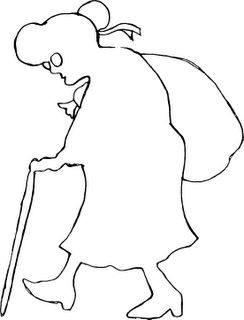This isn’t fully baked, but I’m putting it out there, anyway. Too many questions, and not enough conclusions. Anybody who requires certitude, look elsewhere. The Pope’s death, coming two days after Terri Schiavo’s, has provoked comparisons between their ends. A man with enormous power who doesn’t shun suffering is linked with a woman whose name none of us would ever have known but for the battle around her powerless suffering. John Kass provides one comparison. I do have to wonder what the Pope would have decided, had the last few weeks of his life been stretched out for 15 years. He got off easy. And when his organs started failing, I notice they didn’t hook him up to life support. So somebody drew a line, somewhere—his condition was terminal. Terri’s condition wasn’t terminal, given the medical advances we enjoy. That’s quite a mire. “Playing God” is how people describe Michael Schiavo’s efforts to allow Terri to die. Funny, but they don’t apply the term to the efforts to resuscitate Terri following her initial collapse; not so many years ago she would have died—period—and a feeding tube would have been irrelevant. The “terminal” stage of her condition 15 years ago was only a matter of minutes. Wouldn’t it have been God’s will that she died then? Wasn’t it thwarting God’s will to bring her back? And even if she had miraculously revived without intervention of medical technology, she still wouldn’t have been able to eat. Again, a medical intervention kept her alive. Not playing God?
We rightly fear mistakes where life is concerned. Grey areas are scary, but a coward avoids them. If a mistake was made, wasn’t it made 15 years ago? Wasn’t removal of the feeding tube the correction of that mistake? Is medical intervention only a one-way street? Is it okay to play God so long as the result is extended life? Does God always choose to extend life? The Church has elevated those who suffer for Christ’s sake, holding them up as examples for all. And it was commonplace in the Dark Ages for the pious to deliberately inflict suffering on themselves in order to identify more strongly with the pain and suffering of Jesus. Any who would refuse to endure suffering, inflicted by and/or for God, were deemed less worthy, and sometimes were exhorted to put up with it anyway. Dennis Byrne is advocating that we change our laws so that it would be nearly impossible for a future Michael Schiavo to honor a promise he made to his wife, who might or might not have been the person her parents believed her to be.
I'm sure others can think of other legal reforms that can be made to protect people in guardianship, such as Schiavo, against mistaken, self-serving, misinformed or malevolent family decisions to kill them. To say that the state has no role in protecting those in guardianship is to suggest that the state has no role in preventing child abuse or homicide.
(Of course, I’m pretty sure that “mistaken, self-serving, misinformed or malevolent” remarks about guardians who make an unpopular choice won’t be outlawed.) It seems these judgments were made, most likely based on the Schindlers having gotten their story out there first and loudest. People often make up their minds on such one-sided “evidence,” never once considering that they maybe haven’t heard all the facts, which the courts did. First impressions are notoriously difficult to change (though I did change mine). So ending another’s misery is dismissed as thwarting God’s will, as being closed to the blessings one may find in suffering. Does the quality of the suffering depend on how one ended up in it? Another question. Why should we care about Darfur, for instance? Those people are blessed, man! They’re suffering more than Terri and the Pope combined. They must really be rejoicing. A man beating the life out of his woman and her kids? They’re blessed, too. That’s a scary limb to go out on. I know that ending the suffering in Darfur doesn’t depend on killing the victims, as it may in the case of terminal or life-threatened humans. Yet, somewhere, someone draws a line. Can that line depend on one group’s religious beliefs?

No comments:
Post a Comment